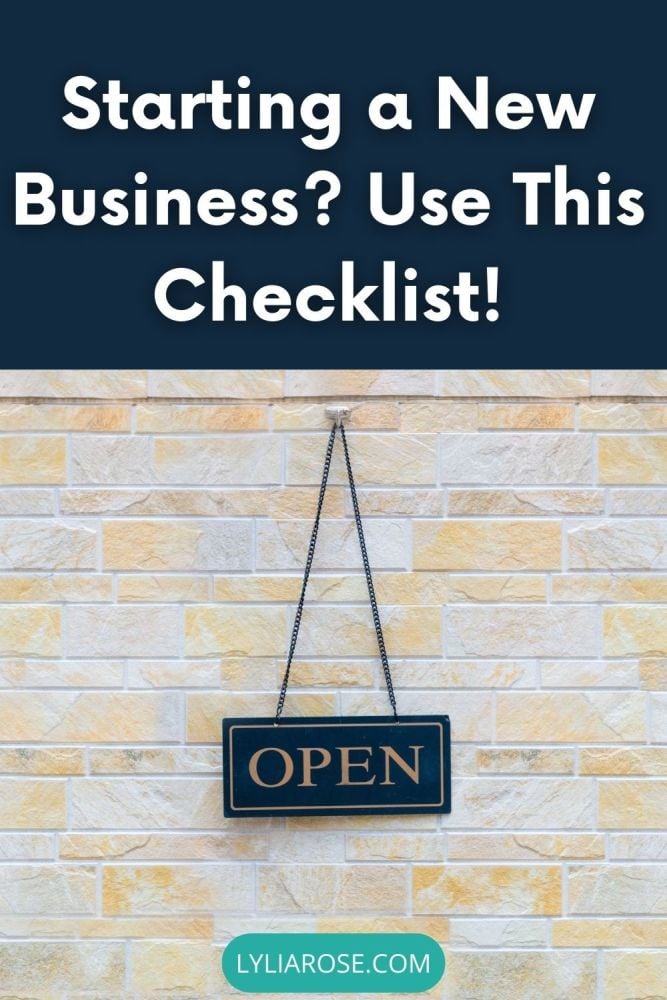Starting a New Business? Use This Checklist!
Posted on
Starting a new business gives you the opportunity to chase your entrepreneurial dreams and work on a project that you are genuinely passionate about.
In fact, there are many reasons as to why you may wish to set up your own company. This includes:
- Increased financial security
- Greater professional freedom
- The opportunity to make a real difference to a specific industry/customer base
- The chance to try something new and challenge yourself
- Opportunities for personal and professional development you would not get at your previous place of employment
- Flexible working hours/schedule
- The chance to do something you truly love
However, running a company, even a relatively small one, is not easy. There are many things you have to contend with every day, from unexpected costs to disgruntled customers, and success is not always guaranteed.
Despite that, there are certain things you can do to set yourself on the right foot.
So, with that in mind, here is a checklist of things you should do before launching your company to give yourself a head start!

Starting a Business Checklist:
❑ Create a business plan. This is an essential step that many entrepreneurs overlook. A business plan outlines your goals, strategies, target market, financial projections, and more. It helps you to organise your thoughts and ideas and provides a roadmap for your business's future.
❑ Decide on your legal structure. Depending on your business type, you may need to decide on your legal structure, whether that's a sole trader, partnership or corporation. Each legal structure has its own benefits and drawbacks, so it's important to do your research and determine which is best for you.
❑ Secure funding. Starting a new business often requires significant capital, so it's important to secure funding before launching. There are many options available, such as loans, grants, and crowdfunding, so it's essential to explore your options and determine the best route for your business. Or you may wish to bootstrap your business. When I started my first online ecommerce business, I sold my own personal belongings and clothes to raise funds to buy my first wholesale stock order.
❑ Come up with a catchy, memorable name for your company/brand. Make sure it is reflective of the product you sell, or the services you offer. Make sure the name is unique and not already trademarked to another business in the same industry.
❑ Register your business with HMRC online if you're in the UK. This will help you later when it comes to paying taxes and keeping on top of payments. (There is a £1000 gross trading allowance which you can earn before registering. Find out more information here.)
❑ Ensure that you have the appropriate insurance to protect yourself and your employees. For example, if you run a building or construction company, you will need public liability insurance. This is used to protect you in the unlikely incident that a visitor suffers an injury or damage to their property as a result of your work. You can obtain industry-leading public liability insurance online, from companies such as Rhino Trade Insurance.
❑ If you are launching a particular product, participate in market research before the official product launch. This will allow you to fix any mistakes and will give you a clearer picture of your target audience.
❑ Build a website for your company. This should include images and product descriptions and a link to an online store. Be sure to include an ‘About’ page that explains your reasoning behind founding the company - this helps you build a relationship with your customers.
❑ If you're moving into a building that another business has vacated, double check what the status of specific utilities are, especially water & electricity. It is all too easy to be setting up in a new location and not even think about whether you're inadvertently paying the water bills for the previous tenant. Also, it's a great idea to read up on switching water supplier, just to see if you can get a cheaper bill; something every new business needs.
❑ Focus on developing a social media presence, by setting up accounts on popular channels such as Facebook, Twitter and Instagram. These platforms could be instrumental in your success and connect you with customers across the globe in just a few clicks of a button - so do not underestimate how useful they can be.
❑ Develop a marketing plan. Marketing is essential for getting the word out about your business and attracting new customers. You should develop a marketing plan that outlines your target audience, marketing channels, messaging, and more. How do you plan on letting people know your business exists?
❑ Establish a customer service strategy. Happy customers are key to any successful business, so it's important to establish a customer service strategy. This should include how you will handle customer complaints, how you will respond to enquiries, and how you will keep your customers informed about your products or services.
❑ Stay organised. Running a business can be chaotic, so it's important to stay organised. This may include using a project management tool, creating a schedule, or outsourcing tasks to free up your time. The more organised you are, the more efficient and productive you will be. How will you organise your office for maximum efficiency? How will you store stock if you sell physical items? How will you organise your inbox so you don't miss important emails? Work out a way to organise the things that your business needs to run productively.
❑ Set up a designated workspace in your home, if you plan to work from home. This does not necessarily have to be a separate room, but an area where you can work comfortably without distraction. Ideally, your office should not be in your bedroom.
❑ Write down a list of things you want to achieve by the end of the year, and display it somewhere you will see often. This will help you remain focused and give you something to work towards each day.
Other Important Considerations for Starting a Business
Here are some additional insights and strategies for starting and running a successful business:
Research and obtain any necessary licenses and permits
Depending on your industry and location, you may need to obtain certain licenses and permits to legally operate your business. It's important to research and obtain these before launching to avoid any legal issues down the line.
Conduct a commercial roof survey
If your business operates from a physical location, especially one inherited from a previous tenant or designed for industrial or retail use, scheduling a commercial roof survey is essential. This process ensures the structural integrity of your roof, identifies potential issues such as leaks or damage, and prevents costly repairs down the line. A professional roof survey can also help you comply with health and safety regulations, safeguarding your employees and customers alike. Investing in regular inspections not only avoids unexpected expenses but also demonstrates your commitment to maintaining a safe and efficient work environment.
Open a business bank account
Separating your personal and business finances is crucial for keeping track of expenses and taxes. Opening a business bank account can help you manage your finances more efficiently. If you are a limited company you will have to open a bank account in your business name. If you are a sole trader, you can open a bank account in your own name. Business bank accounts usually come with additional charges.
Get £50 free cash with a Tide business account!
If you are interested in a business account though, and you have a limited business or are self-employed, then you can get £50 free cash for signing up to the Tide business account and for spending at least £500 in the first three months. Enter referral code K754KJ when signing up to qualify.
Find more free money offers on my website just like this:
Create a sales forecast
Estimating your sales for the coming months can help you plan your inventory, staffing, and other expenses. It's important to be realistic and base your forecast on market research and historical data if available.
Develop a pricing strategy
Setting the right price for your products or services can be tricky, but it's important to get it right. Your pricing should take into account your costs, competition, and target market, among other factors.
Set up accounting and bookkeeping systems
Keeping accurate records of your finances is essential for staying on top of your taxes and making informed business decisions. Setting up accounting and bookkeeping systems early on can save you time and stress in the long run.
Establish a supply chain
If you sell physical products, you'll need to establish a supply chain that ensures you have enough inventory to meet demand. This may involve finding reliable suppliers, negotiating contracts, and managing logistics.
Develop a business continuity plan
Unexpected events can disrupt your business operations, so it's important to have a plan in place to minimise the impact. Your business continuity plan should outline how you will respond to emergencies, such as natural disasters, cyber attacks, or supply chain disruptions.
Final word
These additional items can help ensure that you've covered all the necessary bases before launching your business and increase your chances of success.

